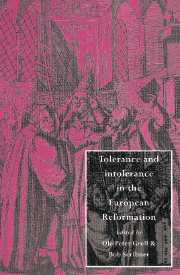Book contents
- Frontmatter
- Contents
- List of contributors
- Preface
- Dedication
- 1 Introduction
- 2 The travail of tolerance: containing chaos in early modern Europe
- 3 Preconditions of tolerance and intolerance in sixteenth-century Germany
- 4 Heresy executions in Reformation Europe, 1520–1565
- 5 Un roi, une loi, deux fois: parameters for the history of Catholic-Reformed co-existence in France, 1555–1685
- 6 Confession, conscience and honour: the limits of magisterial tolerance in sixteenth-century Strassburg
- 7 One Reformation or many? Protestant identities in the later Reformation in Germany
- 8 Toleration in the early Swiss Reformation: the art and politics of Niklaus Manuel of Berne
- 9 Tolerance and intolerance in sixteenth-century Basle
- 10 Exile and tolerance
- 11 The politics of toleration in the Free Netherlands, 1572–1620
- 12 Archbishop Cranmer: concord and tolerance in a changing Church
- 13 Toleration for Catholics in the Puritan revolution
- 14 The question of tolerance in Bohemia and Moravia in the age of the Reformation
- 15 Tolerance and intolerance in sixteenth-century Hungary
- 16 Protestant confessionalisation in the towns of Royal Prussia and the practice of religious toleration in Poland-Lithuania
- Index
13 - Toleration for Catholics in the Puritan revolution
Published online by Cambridge University Press: 07 December 2009
- Frontmatter
- Contents
- List of contributors
- Preface
- Dedication
- 1 Introduction
- 2 The travail of tolerance: containing chaos in early modern Europe
- 3 Preconditions of tolerance and intolerance in sixteenth-century Germany
- 4 Heresy executions in Reformation Europe, 1520–1565
- 5 Un roi, une loi, deux fois: parameters for the history of Catholic-Reformed co-existence in France, 1555–1685
- 6 Confession, conscience and honour: the limits of magisterial tolerance in sixteenth-century Strassburg
- 7 One Reformation or many? Protestant identities in the later Reformation in Germany
- 8 Toleration in the early Swiss Reformation: the art and politics of Niklaus Manuel of Berne
- 9 Tolerance and intolerance in sixteenth-century Basle
- 10 Exile and tolerance
- 11 The politics of toleration in the Free Netherlands, 1572–1620
- 12 Archbishop Cranmer: concord and tolerance in a changing Church
- 13 Toleration for Catholics in the Puritan revolution
- 14 The question of tolerance in Bohemia and Moravia in the age of the Reformation
- 15 Tolerance and intolerance in sixteenth-century Hungary
- 16 Protestant confessionalisation in the towns of Royal Prussia and the practice of religious toleration in Poland-Lithuania
- Index
Summary
Although later than most topics in this volume, the mid seventeenth-century English revolution must hold a significant place in any discussion of when the age of the Reformation, with its characteristic attitudes to tolerance and intolerance, came to an end. Fifty years ago, most historians would have agreed that the Puritan revolution opened a new epoch in the history of toleration and saw the first manifestations of modern liberalism. In recent decades, however, both revisionist and anti-revisionist historians have denied the modernity of tolerationist views in the revolutionary period, arguing that even the most radical thinkers belonged to the previous age and were limited by their theological inheritance to quite narrow views of who could be tolerated and why.
Such historians quite rightly point out that both Cromwell and Milton, the most ardent defenders of toleration among the Independents, explicitly excluded Catholics. Milton's Areopagitica may disappoint modern readers when he qualifies his apparently general arguments with, ‘I mean not tolerated popery and open superstition … ’ Cromwell's crisp reply to an official in Ireland may also look like a contradiction to modern eyes: ‘I meddle not with any man's conscience’, he wrote, ‘but if by liberty of conscience, you mean liberty to exercise the Mass, I judge it best to use plain dealing, and to let you know, Where the Parliament of England have power, that will not be allowed of.’
This may seem to us as much of a let-down as the later concept of universal suffrage for men only, but recent historians have stressed the gulf between the seventeenth-century context and modern liberal thinking.
- Type
- Chapter
- Information
- Tolerance and Intolerance in the European Reformation , pp. 216 - 230Publisher: Cambridge University PressPrint publication year: 1996
- 5
- Cited by



